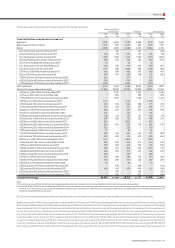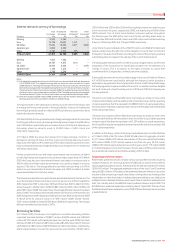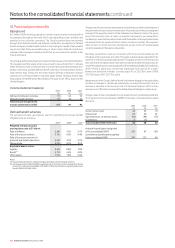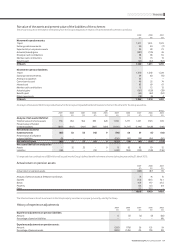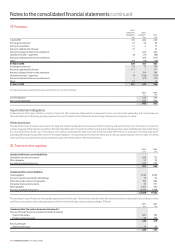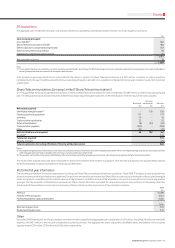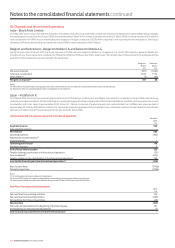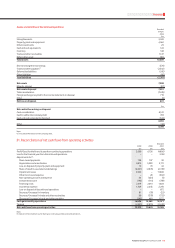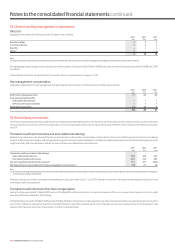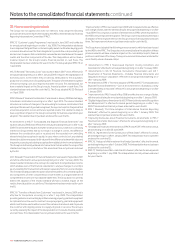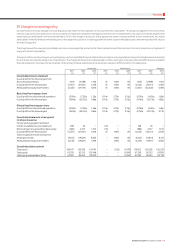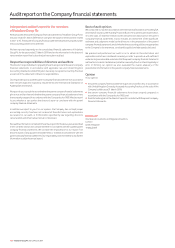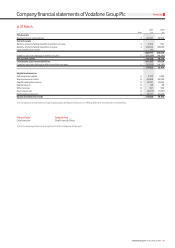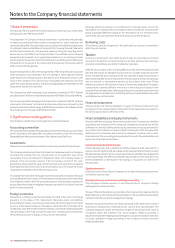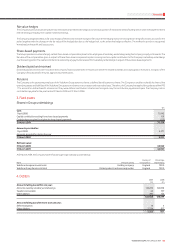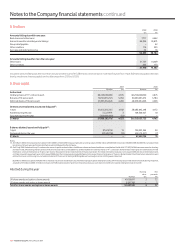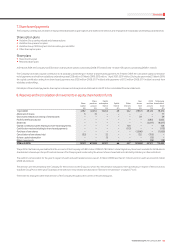Vodafone 2009 Annual Report Download - page 117
Download and view the complete annual report
Please find page 117 of the 2009 Vodafone annual report below. You can navigate through the pages in the report by either clicking on the pages listed below, or by using the keyword search tool below to find specific information within the annual report.
Financials
Vodafone Group Plc Annual Report 2009 115
In September 2006, the ECJ determined in the Cadbury Schweppes case (C-196/04) (the ‘Cadbury Schweppes Judgment’) that the CFC Regime is incompatible with EU law unless
it applies only to wholly artificial arrangements intended to escape national tax normally payable (‘wholly artificial arrangements’). At a hearing in March 2007, the Special
Commissioners heard submissions from Vodafone 2 and HMRC, in light of the Cadbury Schweppes Judgment, as to whether the CFC regime can be interpreted as applying only to
wholly artif icial arrangements and w hether the Vodafone 2 reference should be maintained or withdrawn by the Special Commissioners. On 26 July 20 07, the Special Commissioners
handed down their judgment on these questions. T he tribunal decided (on the basis of the casting vote of the Presiding Special Commissioner) that the CFC regime can be interpreted
as applying only to wholly artificial arrangements and that the Vodafone 2 reference should be withdrawn. Vodafone 2 appealed these decisions to the High Court and this appeal
was heard in May 2008. The High Court granted Vodafone 2’s appeal on 4 July 2008, holding that the CFC regime could not be interpreted consistently with EU law and that, therefore,
the Vodafone 2 enquiry should be closed. HMRC has appealed the High Court’s findings to the Court of Appeal. The High Court’s order requiring HMRC to close the Vodafone 2 enquiry
has been stayed pending the outcome of the appeal . In light of the High Cour t’s decision, the Special Commissioners withdrew the Vodafone 2 reference on 17 July 2008. The hearing
of the Vodafone 2 appeal was heard on 6 and 7 May 2009. The Company is awaiting the High Court’s decision.
The Company has taken provisions, which at 31 March 2009 amounted to approximately £2.3 billion, for the potential UK corporation tax liability and related interest expense
that may arise in connection with the Vodafone 2 enquiry. The provisions relate to the accounting period which is the subject of the proceedings described above as well as to
accounting periods after 31 March 2001 to date. The provisions at 31 March 2009 reflect the developments during the year.
The Company has previously been served with a complaint filed in the Supreme Court of the State of New York by Cem Uzan and others against the Company, Vodafone
Telekomunikasyon A.S. (‘ VTAS’), Vodafone Holding A.S. and others. The plaintiffs made certain allegations in connection with the sale of the assets of the Turkish company Telsim
Mobil Telekomunikasyon Hizmetleri A.S. (‘Telsim’) to the Group’s Turkish subsidiary, which acquired the assets from the SDIF, a public agency of the Turkish state, in a public auction
in Turkey pursuant to Turkish law in which a number of mobile telecommunications companies participated. The plaintiffs sought an order requiring the return to them of Telsim’s
assets or else an award of damages. The plaintiffs discontinued the complaint with prejudice in August 2008. The court disposed of the case on 24 October 2008.
On 12 November 2007, the Company became aware of the filing of a purported class action complaint in the United States District Court for the Southern District of New York
by The Cit y of Edinburgh Council on behalf of the Lothian Pension Fund (‘Lothian’) against the Company and certain of the Company’s current and former off icers and directors
for alleged violations of US federal securities laws. The complaint alleged that the Company’s financial statements and certain disclosures between 10 June 2004 and
27 February 2006 were materially false and misleading, among other things, as a result of the Company’s alleged failure to repor t on a timely basis a write-down for the impaired
value of Vodafone’s German, Italian and Japanese subsidiaries. The complaint seeks compensatory damages of an unspecified amount and other relief on behalf of a putative
class comprised of all persons who purchased publicly traded securities, including ordinary shares and American depositary receipts, of the Company between 10 June 2004
and 27 February 2006. The plaintiff subsequently served the complaint and, on or about 27 March 2008, the plaintiff filed an amended complaint, asserting substantially the
same claims against the same defendants on behalf of the same putative investor class. Thereafter, an additional plaintiff, a US pension fund that purportedly purchased
Vodafone ADRs on the New York Stock Exchange, was added as an additional plaintiff by stipulated order. The Company believes that the allegations are without merit and
filed a motion to dismiss the amended complaint on 6 June 2008. By judgment entered on 1 December 2008, the court dismissed the amended complaint for lack of subject
matter jurisdiction. The plaintiffs subsequently filed a motion for reconsideration of that dismissal, arguing that the court overlooked the claims of the US pension fund, as to
which there had been no subject matter jurisdiction challenge. On 9 April 2009, the court granted that motion to the extent that it sought reopening of the action for the
purpose of adjudication of the claims asserted on behalf of the US pension fund, but denied the motion with respect to the dismissal of Lothian’s claims. The court ordered the
case re-opened pending consideration and order with respect to other arguments of the Company in its motion to dismiss in connection with which the court also indicated
it will address any arguments regarding supplemental jurisdiction over Lothian’s claims. The Company is awaiting the Court’s further consideration and order.
Vodafone Essar Limited (‘VEL’) and Vodafone International Holdings B.V. (‘VIHBV’) each received notices in August 2007 and September 2007, respectively, from the Indian
tax authorities alleging potential liability in connection with alleged failure by VIHBV to deduct withholding tax from consideration paid to the Hutchison Telecommunications
International Limited group (‘HTIL’) in respect of HTIL’s gain on its disposal to VIHBV of its interests in a wholly-owned subsidiary that indirectly holds interests in VEL. Following
the receipt of such notices, VEL and VIHBV each filed writs seeking orders that their respective notices be quashed and that the tax authorities take no further steps under the
notices. Initial hearings have been held before the Bombay High Court and in the case of VIHBV, the High Court heard the writ in June 2008. In December 2008, the High Court
dismissed VIHBV’s writ. VIHBV subsequently filed a special leave petition to the Supreme Court to appeal the High Court’s dismissal of the writ. On 23 January 2009, the Supreme
Court referred the question of the tax authority’s jurisdiction to seek to pursue tax back to the tax authority for adjudication on the facts with permission granted to VIHBV to
appeal that decision back to the High Court should VIHBV disagree with the tax authority’s findings. VEL’s case continues to be stayed pending the outcome of the VIHBV
hearing. VIHBV believes that neither it nor any other member of the Group is liable for such withholding tax and intends to defend this position vigorously.


